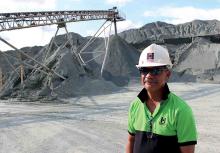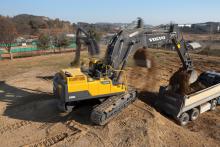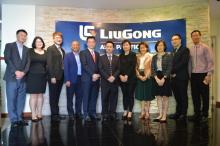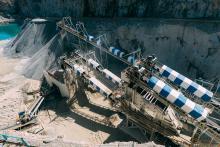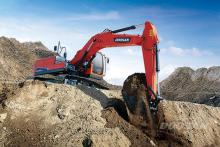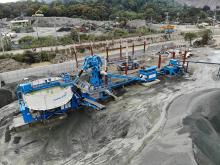There is plenty of vibrancy in the Asia-Pacific aggregates sector, with many leading global original equipment manufacturers (OEMs) competing to meet growing customer demand for the latest premium plants.
Indonesia has the fastest growing aggregates market in South-East Asia, with its current around 135million tonnes/year production set to significantly increase in the coming years. The country is on the up and up. Half of its population of 264 million are aged under 30, creating a strong labour market and an increased need for new urban residential and commercial construction, coupled with new high-quality transport networks to enable Indonesia’s growing working age population to travel to and from their workplaces in a reliable and safe fashion.
Given the above, it was no surprise when an influential report, Global Construction 2025, a global forecast for the construction industry to 2025, by Global Construction Perspectives and Oxford Economics, tipped the country’s average construction output to grow 6% from 2012-2025, taking it from being the tenth biggest construction market globally to the fifth. Indonesia is also currently Asia’s fourth biggest economy (5th if you include Russia) trailing only China, India and Japan.
Such eye-catching statistics equate to the country being a key Asia-Pacific country market for major global premium quarrying equipment manufacturers such as Metso. The Finnish global market heavyweight staged a highly successful customer event in Jakarta last year and is planning to conduct several more in other locations in Indonesia in coming years, with the manufacturer competing well against its peers in the ambitious, infrastructure-hungry nation which is made up of thousands of volcanic islands.
Major infrastructure projects abound in Asia-Pacific, creating huge commercial opportunities for aggregates suppliers and the makers of plants tailored to helping suppliers fulfil their growing order books.
Among Indonesia’s list of impressive highway megaprojects is the US$5.5 billion Trans-Java toll road which will stretch more than 1,100km, from the ports of Banyuwangi in East Java to Merak in Banten province in West Java. Elsewhere, plans have been drawn up for a new highway connecting Laos’ capital Vientiane with Hanoi, the capital of neighbouring Vietnam. Expected to cost more than US$4.5 billion, the 707km route includes a border crossing between Namphao in Laos and Cau Treo in Vietnam. Sri Lanka is home to a US$1bn Central Expressway project, the US$832.8mn Taguig Expressway (MTEX) is taking shape in the Philippines, and Singapore has road and tunnel contracts worth a combined US$603mn.
Similar eye-catching sums to that being spent on grand highway builds are being spent on new rail infrastructure in Asia-Pacific countries including Malaysia and Indonesia. Other high-value investment is being made in South Korea’s manufactured sand sector and Philippines’ residential housing market.
Many billions of yen are also being spent by Japan on new tunnelling routes, new infrastructure for the 2020 Tokyo Olympics, the Maglev High Speed Train project, a US Navy relocation project, and the rehabilitation of the earthquake-hit Tohoku area.
Metso’s Asia-Pacific operation includes 19 culturally and geographically diverse countries in the region: Nepal, Bangladesh, Myanmar, Laos, Thailand, Sri Lanka, Singapore, Japan, South Korea, Bhutan, Taiwan, Philippines, Vietnam, Cambodia, Brunei, Malaysia, Indonesia and East Timor. The company’s Asia-Pacific operation also includes Hong Kong.
Metso works with a variety of Asia-Pacific region aggregates distributors: Ube in Japan; PT FMM in Indonesia; Haein in South Korea; PMCI in Philippines; Miroc in Malaysia; MSP in Myanmar; and Uawithya in Thailand. The OEM sells directly to customers in other countries in the region.
As well as its offices in Japan, South Korea, Thailand, Taiwan, Vietnam, Singapore and Indonesia, the latter also being home to PT. Metso Minerals Indonesia’s Asia-Pacific region service and repairs facility, Metso has the Neles Globe Vale Technology Center in Chungju, South Korea.
Suhen Agarwal, vice president – sales & services, aggregates, Metso Asia-Pacific, says many Asia-Pacific countries are seeing gross domestic product (GDP) growth of more than 4-5%. Such a level of growth is tipped to be sustained over the next two years at least. Most of the region’s nations are also classified as global emerging markets, making them very attractive to direct foreign investors.
“Asia-Pacific’s large geography and population requires consistent development,” says Agarwal. “Developing countries like Vietnam, Thailand, Laos, Cambodia, Myanmar and Philippines will continuously create the needs for infrastructure, transport and energy.
“There are also abundant mineral resources in countries such as Philippines, Laos and Vietnam. Out of nine million hectares of high potential mineral land in Philippines, only 1.4% is covered by mining permits. As such, the country has an estimated $840 billion worth of untapped mineral wealth. Laos has an estimated 570 mineral deposits including copper, gold, zinc and lead.”
Agarwal says that while virtually all Asia-Pacific markets are currently dominated by local players, customers are increasingly wanting to replace their largely inefficient machines based on low-level technology, with more advanced plants and technology. He stresses how this has given a premium brand like Metso a “vast opportunity” to increase its market share.
“The aggregates market in Asia-Pacific has three segments. Metso and other global players are in the Tier 1 high-end customer market which is worth around $64 million. The Tier 2 mid-market customer market is dominated by domestic players in each country, along with Chinese manufacturers. This market is worth around $70 million. Finally, there are customers looking for low-cost products who are catered for by numerous manufacturers, mainly from China. This market is worth around $53 million.
“We are looking to consolidate and maintain the growth momentum in existing markets and maximise market share in Thailand, Malaysia, Japan, South Korea, Philippines and Indonesia. We want to grow market share in Vietnam, Myanmar, Laos, Cambodia by developing distribution. We are also looking to increase our mid-market market share with our Shaouri range of products. That area of the business has a huge potential to grow.”
Agarwal says Metso is investing heavily in training its distributors on not only the company’s products but also on value selling. It is also keen to appoint partners in new Asia-Pacific countries and to develop Metso’s product portfolio for regional customers.
Philippines is one of the fastest growing countries in Asia. This is visible in the rate at which the nation’s infrastructure development is surging. Such growth requires a lot of resources: there is an estimated annual demand of 30 million tonnes of cement and 50 million tonnes of ready-mixed concrete in the capital city, Manila, alone.
With its high-quality aggregates, Hardrock Aggregates is one of many companies catering for Philippines’ ever-rising demand for building materials. The company has an impressive 10% share in Philippines’ expanding aggregates industry. Established more than 20 years ago by Alonzo Espanola, the firm specialises in the manufacture of aggregates at its mountain quarry.
Hardrock produces around three million tonnes/year of aggregates and sells 10,000 to 15,000tonnes/day. One of the main products the company supplies is S1 sand – ranging between 0mm and 6mm - used in concrete batching plants and building projects. With the demand for quality aggregates increasing daily, Hardrock is considering starting production of S3 sand, ranging between 1mm and 5mm, also known as manufactured sand. The fact that very few companies in Philippines produce manufactured sand increases its demand, while creating an exciting new business opportunity for Hardrock.
Since 1998, when Hardrock started manufacturing aggregates, shortcomings in the plant design led to poor end-product quality, low production and high costs. To update the plant and convert a non-profit-producing unit into a profit-making unit, Hardrock hired Vicente T. Pulvinar – who turned to Metso for a lasting solution.
“I joined Hardrock in 2007 and noticed a lot of discrepancies in the design of the plant. Having a 42x56 jaw crusher in the primary stage with a Symons crusher in the secondary stage was a clear mismatch, demanding a complete re-engineering of the plant,” says Pulvinar.
“I simultaneously started creating the new layout with Metso equipment, without letting production come to a stop in the old design,” he adds.
The old, ill-structured process prompted Hardrock to go all out for the new design and equipment. One by one, all machines were replaced to achieve the targeted production. Currently, Hardrock has two Metso Nordberg C140 jaw crushers in the primary stage, two Metso Nordberg HP400 and four HP300 cone crushers in the secondary stage along with four vibrating screens to produce 500tonnes/hour of aggregates.
The installation of the new design is said to have made a huge difference in the quantity, from one million to three million tonnes/year, and to the quality of Hardrock’s production; the company has also seen big reductions in its plant operating and maintenance costs.
Pulvinar says that due to the huge increase in production volumes and significant reduction in operating costs, Hardrock can compete with industry big hitters for many years to come.
He continues: “Ever since we installed the C140 in the primary stage and the HPs in the secondary stage, we were facing new challenges within our quarry: the pressure to produce enough for us to feed the crushers. The technology is pushing us for the better, and I completely believe this will enable us to attain utmost efficiency in the future.
“The HPs have good speed and shape, which reduces downtime tremendously and leads to easy machine maintenance.”
As Metso’s Suhen Agarwal notes, Hardrock is one of many insightful and ambitious Asia-Pacific aggregates processing firms looking to grow their commercial footprint. It will be fascinating to see whether such ambition translates into a greater percentage of Metso’s global business centring on arguably the world’s most eclectic region.

